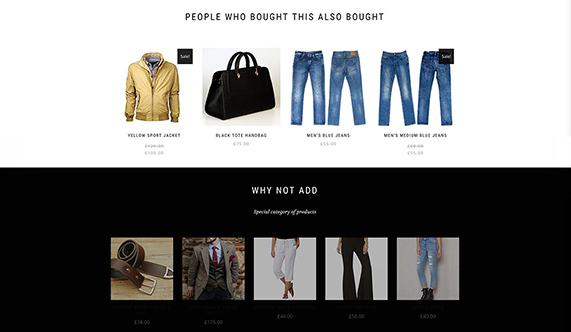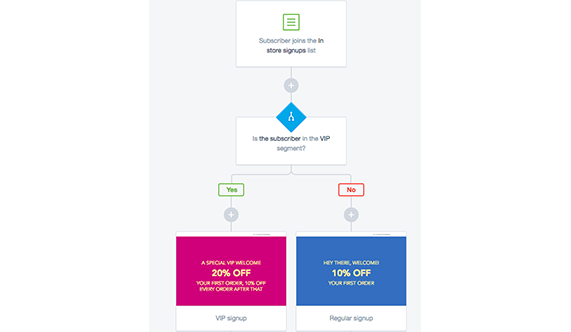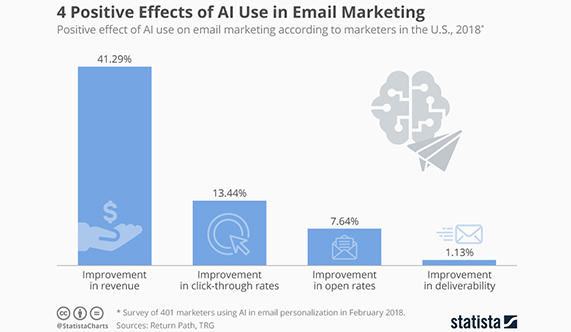Artificial intelligence and email? Will it really blend well? Let’s see today!
Although email is far from being the most exciting digital marketing channel, it remains as one of the most productive options for innumerable B2B companies. In fact, it generates a whopping revenue of $38 for every $1 spent, according to the latest study by Campaign Monitor.
However, using email marketing only for commercial purposes may put you in the back seat. Technology has moved on, and just like every other aspect of the internet, email has grown and evolved too. AI has dramatically expanded what we can do with the email.
“Whether you know it or not, Artificial intelligence is already taking over email marketing.”
AI isn’t something new for some of the email service providers. They have long recognized that AI can improve the unique open and click-through rates while saving money and effort.
If you didn’t know about this next “big thing” in email marketing, this blog is exclusively curated for you. Here we will take a denser look at how AI is impacting email marketing and how can you embrace it to take your business to new heights by carefully choosing curated sales leads lists when you send out your marketing campaigns.
Chart: Advantage of Using Artificial Intelligence in Email Marketing
This chart highlights the survey result by Return Path and TRG. It shows a few of the areas where email marketers can experience improvements by using AI technology.
Image Source: Statista
Other benefits of AI in email marketing:
- Artificial Intelligence can offer a detailed analysis of email marketing campaigns.
- It can provide better insights into company growth and revenue.
- It can enhance the daily performance and results of email marketing.
- AI can assist marketers in retaining existing customers while identifying new ones.
If you are unsure of how email marketers are capable of achieving such impressive results through AI, worry not. Let me show you how marketers can incorporate as well as leverage AI to make the most out of their email campaigns.
Subject Line & Message Optimization
We know that a good email subject line will encourage recipients to click through and read it, whereas a lousy subject line will conveniently be ignored and sometimes marked as spam. So, acing your subject line is crucial for the success of your email campaigns.
And, the best part is – you don’t require a lot of research or analysis to determine the perfect subject line for your messages. With the emergence of AI, it has now become an extremely simpler task.
AI, along with machine learning algorithms, analyzes the results of previous campaigns and learns what resonates well with a specific marketer’s audience. Then it uses natural language technology to create a perfect subject line, body copy, and calls-to-action that sounds like a human.
Did you know?
AI-generated subject lines outperform human-written subject lines more than 95% of the time, as per the Phrasee report.
Identifying the Ideal Send Time
Do you do a lot of guesswork to find out the best time to send an email? We understand that knowing an ideal time is a critical factor for email campaign success.
For example, some marketers prefer sending emails when competitors are quiet, whereas others do the contrary. They send their messages alongside their competitors.
Many email service providers ease your pain with the “Send time optimization” feature. These tools utilize advanced AI that tracks the time when subscribers are most likely to open, read, and click the message, and then adjust the send time on a per-subscriber basis.
Consider Oracle’s AI-based Send Time Optimization (STO) solution. It utilizes proprietary algorithms and historical data to identify the optimal day and time to message recipients on the list.
The results of this STO was tremendous. A travel industry customer saw an increase in their unique open rates by 37%, unique click rates by 28%, and a 53% reduction in email bounces compared to others receiving the email at a default time.
Simplified Predictive Personalization
Personalization is already a hot topic of discussion among B2B organizations. So, it’s more likely you have been implementing personalization into your email campaigns. It could be a simple thing like using customer names in the emails or personalized tokens to help customers track order details.
But by using Artificial Intelligence to personalize the emails, you can take campaigns to an entirely new level. That is, with the help of predictive analytics, AI can get hold of complex customer data to predict the future behavior of customers and data trends.
With these high-level data-driven insights, you can easily create personalized emails for individual customers. And, this level of personalization would be challenging to achieve without AI.
AI’s Predictive Personalization covers these Areas:
- Segmentation: With AI and machine learning algorithms, businesses can access the precise details of customers and their behavioral signals to segment the list. The segmentation can be based on purchase history, position in sales funnel, demographics, or geographical location.
Consider this personalized email from Nissan, where it reminds the users to take care of their vehicles.
 Image Source: Nissan Newsletter
Image Source: Nissan Newsletter
- Product recommendations: According to Mckinsey report, 35% of Amazon and 75% of Netflix customers purchase or watch movies based on product recommendations. And, this fact still holds today.
We know that AI has the ability to analyze the customer’s online activity and purchasing pattern. Hence use this information from AI tools to send relevant product recommendation emails in real-time.
“Personalized product recommendations will help you build customer loyalty and improve the click-to-convert ratio of emails.”
The Webtrends Optimize product recommendations engine utilizes the buying history of other website visitors who has a similar browsing profile and then recommends products proven to be of the same interest.
Image Source: Webtrends Optimize
- Offering the right coupons: Using AI to customize the offers around like-minded subscribers will upsurge conversions. AI tools help you determine which offer to send to each subscriber based on their past email behavior.
Here’s an example by Campaign Monitor where an automated journey is used when customers join an email list in-store. In this scenario, the tool segments newcomers and VIP customers and then give a corresponding discount to them.
 Image Source: Campaign Monitor
Image Source: Campaign Monitor
Lastly, Fine-Tuning Your Email with A/B Testing
Email marketers have already been using A/B testing. However, it is evolving currently with the emergence of AI. Now you can test email subject lines, design elements, call-to-actions, copy, and product offerings entirely through AI tools.
With the help of Artificial Intelligence, you can simply set some parameters depending on your test, such as what you want to test, a number of the audience involved, and the duration of the test. Based on the result, the automated system will determine the best version and then send it to the remaining audience.
Say, for example, you set up an A/B test to see which subject line increases the email open rate. You build a test group of 20 percent — 10 percent for each version of the subject line. Later you set the winning subject line to apply to the remaining percentage of subscribers.
A/B testing helps you understand what the audience wants to see from you, and how you can improve the future email campaigns.
“AI will no doubt become the promising future of email marketing.”
To Sum It Up
Now we know how AI offers creative setup behind effective email marketing campaigns. Hence it is sure a worthwhile investment for any marketer. Including AI-powered email marketing would improve ROI and also lead to optimum utilization of resources. So, in conclusion, if you aspire to be successful in the long run of the B2B industry, it is high time to choose AI.



